Past Winners
Read the full history of the Farfel Award. To read biographies of past winners, please click on the years below.
2025: Elena Grigorenko, Hugh Roy and Lillie Cranz Cullen Distinguished Professor of Psychology
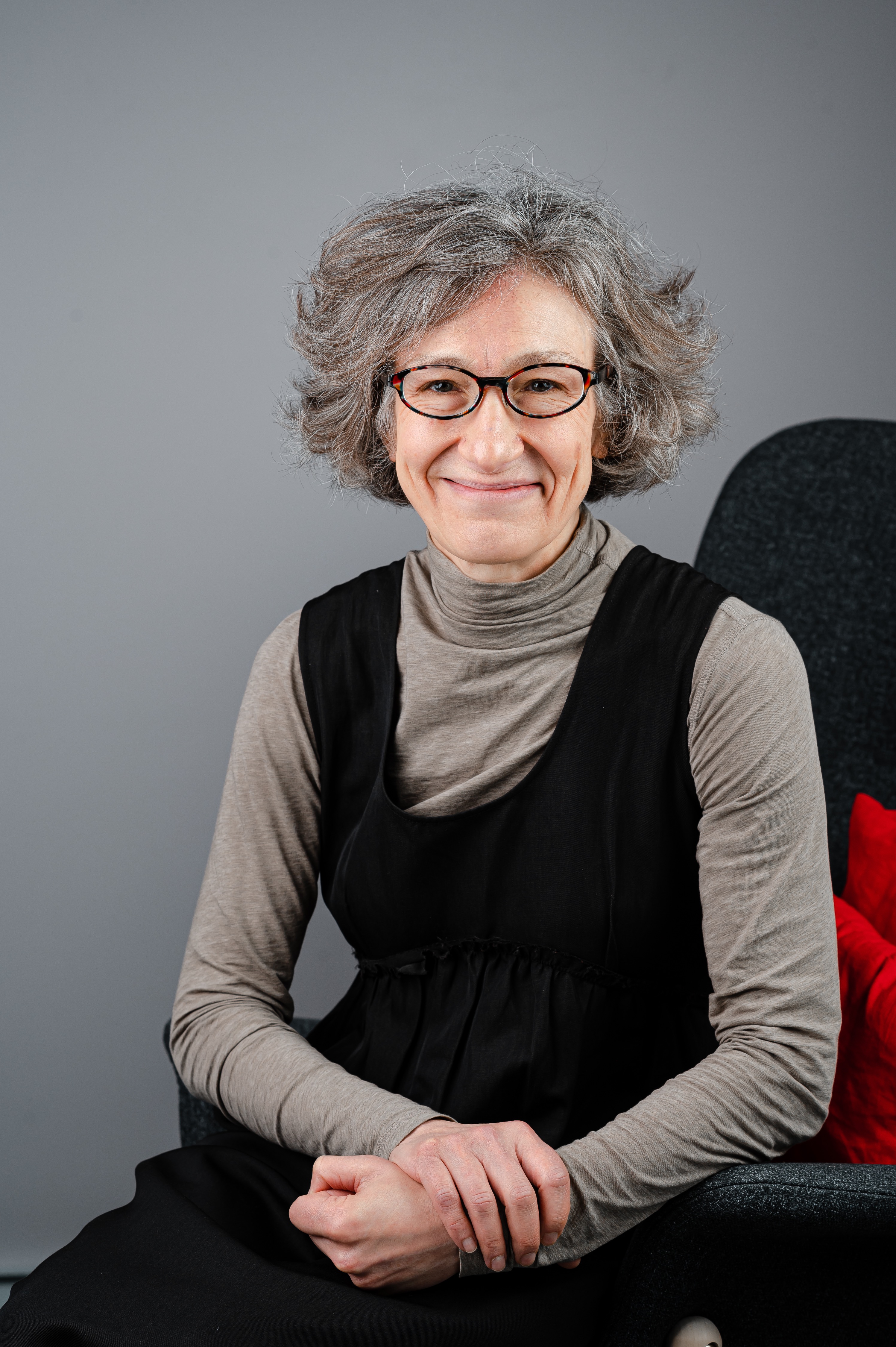
This year, Hugh Roy and Lillie Cranz Cullen Distinguished Professor of Psychology Elena Grigorenko commemorates 10 years at the University of Houston. During a decade of research, teaching and service, Grigorenko has graduated many students. Likewise, she has been instrumental in bringing a significant amount of research funding to the University.
Her work has been applauded by both peers and pupils. Now, she’s being recognized with the University’s highest honor for faculty, the Esther Farfel Award.
This award is particularly meaningful for Grigorenko as the two faculty who persuaded her to come to the University are past Farfel Award recipients.
Grigorenko arrived at UH fresh from a position at her alma mater Yale University. Both UH and the city of Houston provided a good base for her research interests in child and adolescent learning and developmental disorders.
The opportunity to work with the Harris County Juvenile Probation Department (HCJPD) was particularly enticing, she added. Beyond the research and academic components of this course, it yielded many benefits to the community.
At UH, Grigorenko serves as a Developmental, Cognitive, and Behavioral Neuroscience and Clinical Psychology faculty member in the Department of Psychology. She also holds faculty roles with the Baylor College of Medicine and Yale University.
She’s an award-winning scholar and previously earned a UH Faculty Excellence Award in 2021. Additionally, she has authored more than 600 peer-reviewed articles, book chapters, and books.
She holds a Ph.D. in general (cognitive) psychology from Moscow State University in Russia and a Ph.D. in developmental psychology and genetics from Yale University. For her re-specialization in clinical (forensic) psychology, she attended Fielding University.
She cites UH’s students and colleagues—especially Suzanne Kieffer, director of research and academic programs—as prime motivation to continue the work she started here.
2024: Zhifeng Ren, Ph.D.
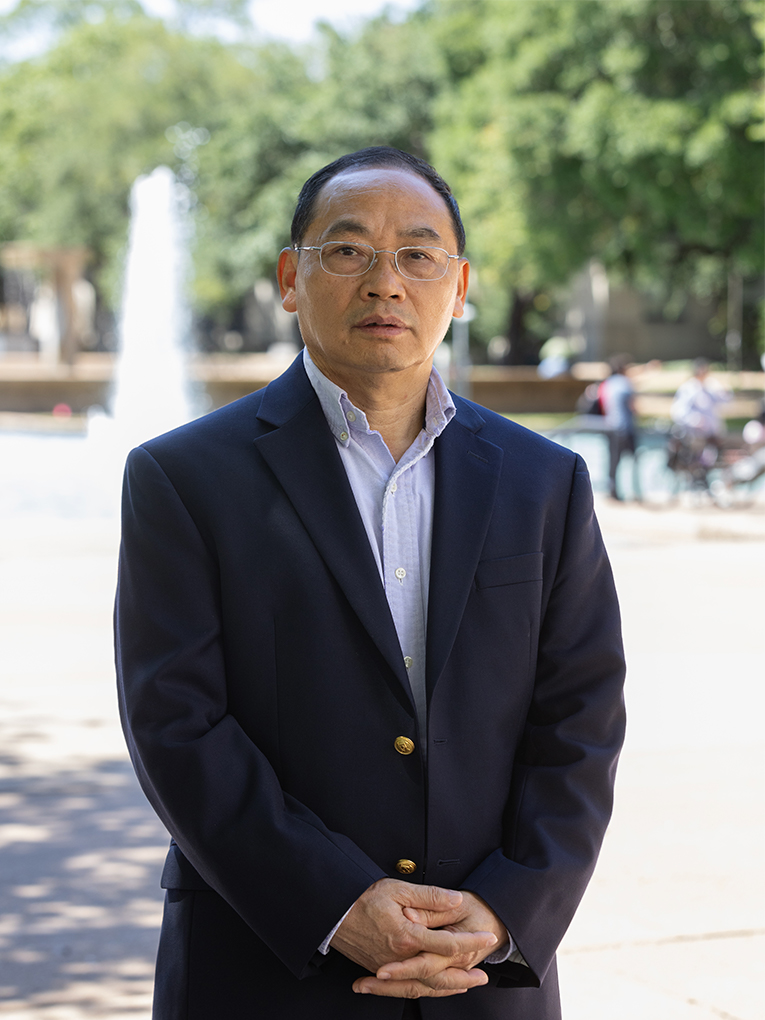
Zhifeng Ren is the 2024 recipient of the University of Houston’s highest faculty honor, the Esther Farfel Award.
Ren, UH’s Paul C. W. Chu and May P. Chern Endowed Chair in Condensed Matter Physics, is being acknowledged for his excellence in research, scholarship, teaching and service.
At UH, Ren serves as Director of The Texas Center for Superconductivity at UH (TcSUH).
He has garnered international acclaim for his work in high performance thermoelectric materials; catalysts for water splitting; nanosheet for enhanced oil recovery, solar energy conversion; flexible transparent electrodes; and carbon nanotubes and nanocomposites.
He is consistently listed among Clarivate’s Highly Cited Researchers with published papers ranking in the top 1% of citations for field and publication year.
In 2022, his expertise was key in demonstrating cubic boron arsenide as “one of best semiconductors known to science.” This discovery was named one of the year’s Top 10 Breakthroughs by Physics World magazine.
Other honors include the Edith and Peter O'Donnell Award in Science from The Academy of Medicine, Engineering & Science of Texas; the Humboldt Prize from the Alexander von Humboldt Foundation; and a Distinguished Senior Research Award from Boston College. In 2018, he received a UH Faculty Award for Excellence in Research, Scholarship and Creative Activity.
He holds fellowships with the National Academy of Inventors, Materials Research Society, American Physical Society and American Association for the Advancement of Science.
As a scholar, Ren has authored or contributed to more than 630 published articles and papers. He serves as the founding Editor-in-Chief for one of the top journals Materials Today Physics and was the founding Editor-in-Chief for Soft Science. He is also a member of several editorial boards for top journals, including Materials Today, Research, npj Quantum materials, Progress in Physics and many others.
Ren’s research has been featured in the media, including a collaborative effort to create an air filter that traps and kills COVID-19 and the use of superconductors for highway and rail transportation.
He arrived at UH in 2013 after being recruited by TcSUH Founding Director Paul C. W. Chu. A decade after being sought by the longtime UH researcher and superconductivity pioneer, Ren delivered the inaugural Paul C. W. Chu and May P. Chern Endowed Lecture.
Ren joins an elite group of UH faculty members who have received the Farfel Award. This honor has been presented annually to UH professors who continue to elevate the University’s reputation and academic profile while mentoring rising researchers.
2023: Stuart Dryer
 Professor of Biology & Biochemistry
Professor of Biology & Biochemistry
At UH, Stuart Dryer has successfully balanced teaching, research and serving as a mentor to aspiring scholars. His talents in these areas have earned him a Teaching Excellence Award and Research Award. They, also, are admired by both his peers and pupils. It also has kept Dryer energized and engaged during his 26 years at UH. His deep involvement within the College of Natural Sciences and Mathematics led to a role as department chair. For nearly nine years, Dryer guided the Department of Biology and Biochemistry. During that time, he was instrumental in growing its professoriate. His time in this position also was marked by the development of the Center for Nuclear Receptors and Cell Signaling and by growth of research within the department.
Dryer himself remains one of his department’s most productive scholars with 110 refereed papers to his credit and more than 6,000 citations with an h-index of 49. His work in neurobiology, circadian rhythms and kidney disorders has extended off campus as well through partnerships in the Texas Medical Center (TMC). His work on the physiology of kidney disorders came later in his career. He credits partnerships at TMC (particularly with Baylor College of Medicine) for supporting such critical research. Houston and its renowned medical facilities have been an invaluable platform for him and so many other UH faculty members, he said.
Now, UH has its own state-of-the-art medical school, the Tilman J. Fertitta Family College of Medicine. Dryer was among those who helped establish this important addition to the University in 2019. He also teaches at the college, helping prepare tomorrow’s physicians. Dryer also has lent his insights and experience to guiding students within his own college, as well as junior faculty. During his esteemed career, the longtime professor has seen both pupils and professors flourish professionally. Their success is validating and inspiring for Dryer. Learn more about Stuart Dryer and the 2023 Farfel Award here.
2022: Wynne Chin
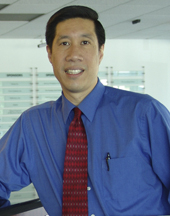 C. T. Bauer Professor of Decision and Information Sciences
C. T. Bauer Professor of Decision and Information Sciences
Chin arrived at UH in 1997 bringing his groundbreaking research in information sciences to campus. As a sought-after scholar, he was pursued by a number of leading universities, but he instantly recognized that UH would be the perfect destination for his work.
“ UH is an excellent incubator for success,” he said. “While the University continues to grow its resources and facilities, it always has had a ‘can do’ spirit that uplifts its community and inspires them to work harder and accomplish great things. You can’t always find that at other universities.”
Upon his entry to UH, Chin already was renowned as a proponent of the Partial Least Squares Path Modeling (PLS) technique. Chin’s expertise on the subject was complemented by his development of PLS-Graph software. This free tool has become a universal platform for researchers around the globe and accentuates Chin’s commitment to both advancing the discipline and supporting his peers. Likewise, his 1998 book chapter “The partial least squares approach to structural equation modeling” (published in the book “Modern methods for business research”) remains a go to resource for scholars and has been cited close to 24,000 times.
Chin has authored 170 books, book chapters, papers and conference proceedings. He remains the sixth most cited UH professor with 75,000 career citations and is ranked third worldwide in first authored articles published in his discipline's top two journals - MISQ and ISR from 1990 through 2016. Within the more general field of information and communication technologies, Chin holds rankings of No. 295 and No. 147 out of 570,025 scientists for career and single year contributions respectively. He is also the sixth most cited researcher in the world related to structural equations modeling.
Since his arrival at UH’s C.T. Bauer College of Business, Chin has worked diligently to support students and continues to teach core undergraduate courses such as Supply Chain Management, Business Modeling and Analysis and Introduction to Business Analytics. At the graduate level, he presides over classes such as Business Modeling for Competitive Advantage and leads a doctoral seminar for management information systems students as well as mentoring doctoral students in other departments as disparate as Social Work, Education, and Earth and Atmospheric Sciences.
Outside of the classroom, Chin has been an ardent advocate for faculty and shared governance. As the only UH faculty to serve twice as president of Faculty Senate (2008 and 2015), he was elected president of the Texas Council on Faculty Senates in 2019, where he helped establish the National Council of Faculty Senates.
His support of fellow professors has been particularly visible on campus as he started a mentoring group to support new Asian and Asian American faculty members. Locally, he founded the Houston Chinese Faculty Association and nationally, he contributes his energies to organizations such as Leadership Education for Asian Pacific and Asian Pacific Americans in Higher Education. Learn more about Wynne Chin and the 2022 Farfel Award here.
2021: Earl L. Smith III
 Greeman-Petty Professor in Vision Development
Greeman-Petty Professor in Vision Development
College of Optometry
Dr. Smith has been a faculty member at the University of Houston since 1978. He received his OD in 1972 and his PhD in 1978 from UH and subsequently joined the faculty of the College of Optometry. During his tenure, he has served as the Chair of the Basic Sciences Department, Associate Dean for Graduate Studies and Research, Dean of the College of Optometry, and as the Interim Chief Health Officer of the University of Houston. "The Farfel Award is the highlight of my academic career. This award is particularly meaningful to me because I came to UH as a student in 1968 and have spent my entire academic life here…a rare privilege," said Dr. Smith.
Dr. Smith is an internationally acknowledged expert on myopia, also known as nearsightedness. His original research findings are seminal works in the field and his work on myopia has been translated to successful human clinical trials that has improved long-term eye health for patients and has been the foundation for the development of optical devices such as glasses and contact lenses that reduce the burden of myopia. His research has earned him multiple awards including the Prentice Medal in 2010 from the American Academy of Optometry and recognition as a Distinguished Scholar and Fellow by the National Academy of Practice in Optometry in 2012. Professor Smith has published over 200 peer-reviewed publications and received 38 years of continuous research funding from the National Institute of Health’s National Eye Institute (NIH/NEI). He also has five US patents related to his work on myopia.
Professor Smith is an outstanding educator. He has been continually involved in the education of professional optometry and graduate students since his initial appointment as an Assistant Professor in 1978. He has served as a member on 49 Masters or PhD committees, including 10 PhD students as the primary mentor. He has also mentored post-doctoral and junior faculty members toward successful independent research careers. During his tenure as Dean, he helped junior faculty towards independent research careers, including serving as a consultant on an Assistant Professor’s first research project grant. In 2003, The Texas Optometric Association presented him with the Educator of the Year award. In 2015, the American Optometric Association inducted him into National Optometry Hall of Fame.
Dr. Smith’s service to the college, University, and profession are unmatched. Recently, at the University level, he served on the Health 2 Building Committee, the Medical School Advisory Committee, and the College of Medicine Associate Dean Search Committee. His vision for and construction of the Health 1 building for Optometry and the University contributed to the expansion of the healthcare mission at UH. At the professional level, he has been a reviewer for and chair of numerous NIH/NEI study sections including chair of many special emphasis panels, and as a member of the prestigious National Advisory Eye Council. He has served nearly every major organization in optometry, holding key leadership positions, including President of the Association for Schools & Colleges of Optometry and the American Academy of Optometry’s Foundation. He currently serves on the Board of Directors for the National Alliance for Eye and Vision Research and Optometry Giving Sight.
2020: Richard Willson
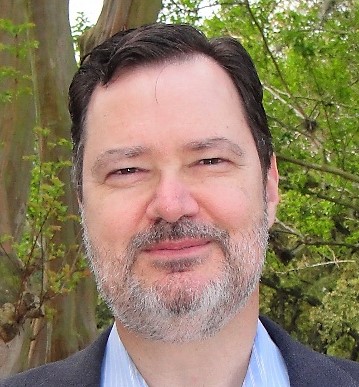 Huffington-Woestemeyer Professor of Chemical and Biomolecular Engineering, Biology
and Biochemistry, and Biomedical Engineering
Huffington-Woestemeyer Professor of Chemical and Biomolecular Engineering, Biology
and Biochemistry, and Biomedical Engineering
Cullen College of Engineering
Dr. Willson has been a faculty member at the University of Houston since 1988, and
his influence and service have been strong and remarkable. From 2008 – 2010, he was
a member of the President’s Strategic Actions Group, organizer and chair of the “Tier
One” Nationally Competitive Research Universities Committee, and primary author of
the UH “Tier One” report. From 2011 – 2014, Dr. Willson contributed to the UH proposal team for the National Science Foundation ADVANCE program for greater equity
and diversity of minority and female STEM faculty. From 2015 – 2016 he was the interim
associate vice president for technology transfer, wrote the first “Guide to Startups
at UH,” and launched training programs in intellectual property and startups for the UH community.
He earned his B.S. and M.S. degrees in chemical engineering from the California Institute
of Technology (Caltech), and completed his Ph.D. in biochemical engineering and postdoctoral
studies in biochemistry at the Massachusetts Institute of Technology (MIT). Dr. Willson
is the recipient of the Presidential Young Investigator Award from the President George
H. W. Bush administration, and an elected Fellow of the American Institute of Medical
and Biological Engineering, the American Chemical Society, and the American Association
for the Advancement of Science. He is a member of the National Academy of Inventors,
and is a Senior Affiliate of The Houston Methodist Hospital Research Institute. His
research interests are in biopharmaceutical purification and medical diagnostics.
Most recently, two of Dr. Willson’s Ph.D. students who founded Luminostics, a startup
technology company based on work done in his laboratory, are collaborating with the
French healthcare company Sanofi to develop a smartphone-based self-testing solution
to determine if someone has COVID-19.
2019: Laura Frishman
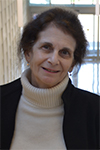 Moores Professor
Moores Professor
College of Optometry
Dr. Laura Frishman is a distinguished faculty member in the College of Optometry, and has been at the University of Houston for the past 29 years. She has taught in both professional and graduate programs, serving on 44 Ph.D. committees (14 as chair or co-chair) and 14 master’s committees (7 as chair), and has been a Moores Professor since 2000.
Dr. Frishman served as the department chair of the Basic Vision Sciences Department from 2001-2004, and the Associate Dean for Graduate Studies and Research from 2003 to the present. Her research has focused on refining noninvasive electrophysiological approaches for evaluating retinal and anterior visual pathway function in normal subjects and subjects with inherited or acquired diseases that affect visual function.
She has maintained almost 30 years of continuous funding from the National Eye Institute (NEI) as a principal investigator for her research on “Proximal retinal responses and the ERG” or as a co-investigator with department colleagues. She also serves as the principal investigator for the College of Optometry’s NIH/NEI CORE Grant for Vision Research, NIH/NEI Grant for Short-Term Training for Students in Health Profession Schools, and NIH/NEI Houston Area Vision Training Program.
Her original findings of two electroretinogram (ERG) components, known as the scotopic threshold response (STR) and the photopic negative response (PhNR), that reflect the activity of inner retina neurons – the retinal ganglion and amacrine cells -- are seminal in visual electrophysiology. Her early work with Drs. Roy Steinberg and Paul Sieving led to the discovery of a late negative ERG potential that seemed to correspond to the absolute rod threshold, a feature of the retinal response that is still relevant today in normal function and in pathology. She has also transitioned her research into clinical applications.
She is a fellow of the Association for Research in Vision and Ophthalmology (FARVO), American Academy of Optometry (FAAO), and a board member of the International Society for the Clinical Electrophysiology of Vision (ISCEV). She has received funding for research, training and core center grants from the NEI, and has won awards from the AAO and ISCEV for her scholarship and service. Dr. Frishman received her undergraduate degree from Vassar College in Poughkeepsie N.Y. and her MS and Ph.D. in psychobiology from the University of Pittsburgh. She did postdoctoral training in visual neuroscience at Northwestern University and the University of California San Francisco where she became a research faculty member with funding from the National Eye Institute.
2018: Suncica Canic
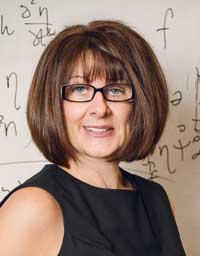 Department of Mathematics
Department of Mathematics
College of Natural Sciences and Mathematics
Dr. Canic, an applied mathematician whose work has had major scientific impact and won her international acclaim, initially gained recognition for her work on nonlinear hyperbolic conservation laws, transonic flow problems, and shock reflections.
She moved out of her comfort zone when she became interested in how fluid-structure interactions for incompressible, viscous fluids interacting with elastic or viscoelastic structures could have biological applications.
She is one of the world’s leading researchers in the area of mathematical modeling and scientific computing related to cardiovascular science, establishing many collaborations with physicians and researchers in the Texas Medical Center. Already, her research group has seen the results of direct application to understanding and the design of stents. Dr. Canic also led the development of a procedure for heart valve replacement surgery that is less invasive than open-heart surgery.
Her extensive list of publications have appeared in leading mathematical and scientific journals, including her Archive for Rational Analysis (2013) paper which is ranked in the top 1% by the number of citations in Mathematics according to the Web of Science, and her most recent paper in the Journal of Computational Physics was the top most downloaded paper in the past 90 days as of November 2017.
Known as an excellent speaker and prolific scientific writer, Dr. Canic has presented at numerous lectures worldwide, including being invited by the American Mathematical Society to provide Congressional Briefings about issues surrounding mathematical research and its impact. The National Science Foundation (NSF) also invited her to present at the Mathematical and Physical Sciences Distinguished Lecture.
Dr. Canic has four active NSF grants, totaling approximate $1.5 million over four years. She has received previous funding from the National Institutes of Health, the Department of Education, the Heart Association, and the Texas Higher Education ARP Program.
She serves on the Executive Committee of the department of mathematics, and has played a major role in committees surrounding faculty recruitment/hiring and research. She also currently serves as the Director of the UH Center for Mathematical Biosciences, a position held since 2008. Outside of UH, Dr. Canic is a member of the NIH College of Scientific Reviewers, continually serves on NSF Review Panels, sits on the editorial boards of six scientific journals, serves on the Board of Governors of Institute for Mathematics and its Applications, the Scientific Advisory Board of the Association of Women in Mathematics, and the Program Director of a Society for Industrial and Applied Mathematics Activity Group.
2017: Jack M. Fletcher
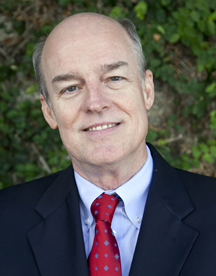 Department of Psychology
Department of Psychology
College of Liberal Arts and Social Sciences
Dr. Jack Fletcher has been affiliated with the University of Houston since 1979, first as an adjunct assistant professor to his current tenured appointment in 2006. He exhibits the core values of the Farfel award, demonstrating excellence in teaching, research, and service.
Dr. Fletcher, a board-certified child neuropsychologist for the past 30 years, is known for his research in learning disabilities and extensive work in better understanding human cognition as it relates to the identification, classification and treatment of developmental disabilities, in particular disorders or reading, math, learning, attention, intellectual disabilities, traumatic brain injury, hydrocephalus, and spinal bifida. His scholarly output includes over 400 peer-reviewed manuscripts, 100 chapters in edited volumes, and authored three books.
He has directed or collaborated on over $125 million in funded research, with funding from the National Institutes of Health, the US Department of Education and the National Science Foundation. Funded by the National Institute of Child Health and Human Development (NICHD), Dr. Fletcher directs The Texas Center for Learning Disabilities and is involved in a long-term study involving genetic, neuroimaging, and neuropsychological factors in spina bifida.
Dr. Fletcher has mentored numerous students who have pursued careers in academia or can be found at top universities and medical centers in the US and around the world. He served in many capacities in the federal and national level, including the NICHD National Advisory Council, the RAND Commission on Reading Comprehension, the National Research Council Committee on Scientific Principles in Education Research, and the President's Commission on Excellence in Special Education. At UH, he has served and chaired the Research and Scholarship Committee, served as Chairman of the Department of Psychology, and as the Interim Associate Vice President for Research Administration. He was the recipient of the Samuel T. Orton award from the International Dyslexia Association in 2003 and a co-recipient of the Albert J. Harris award from the International Reading Association in 2006.
He graduated with a Ph.D. in Clinical Psychology from the University of Florida in 1978 and received his Bachelor of Arts degree from Davidson College in 1973.
2016: George E. Fox
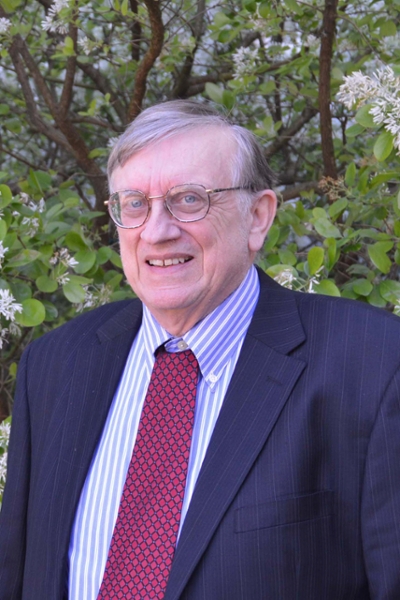 Department of Biology and Biochemistry
Department of Biology and Biochemistry
College of Natural Sciences and Mathematics
An active member of the University of Houston faculty since 1977, George E. Fox exemplifies the attributes of a Farfel award winner through his research, service, teaching, and external recognition. He has published over 172 peer-reviewed scientific papers in such well-known scientific journals as Nature and the Proceedings of the National Academy of Sciences of the USA, and is well known to molecular biologists both in the United States and abroad. He has been invited to present at numerous institutions in Germany, Scotland, Mexico, Hawaii, Austria, Florence, and Paris. He most recently spoke at the dedication of the Carl R. Woese Institute for Genomic Biology.
Professor Fox is an active researcher and has received continuous grant funding since 1978, raising over $8,636,897 in external funding. He has three active grants, two of which will continue into 2017 and total over $898,000. Among his many accomplishments, Professor Fox is an elected fellow of the American Academy of Microbiology, the American Institute of Medical and Biological Engineering, the American Association for the Advancement of Science, and the International Astrobiology Society. He has held numerous administrative appointments within the university, including the interim chair of the former Department of Biochemical and Biophysical Sciences during its formation, 13 years as the director of the Institute for Molecular Biology, three years as the vice chair of the Biology and Biochemistry Department, and is a current member of the department’s Promotion and Tenure Committee and the University Library Committee. He also serves externally on the Editorial Boards of five journals, has chaired the local Division of the American Society of Microbiology, and has served as the chair of the 2010 Origin of Life Gordon Research Committee.
Professor Fox graduated with a Ph.D. in Chemical Engineering from Syracuse University in 1974 and received his Bachelor of Science degree in Chemical Engineering from the same institution in 1967.
2015 : David Ashley White
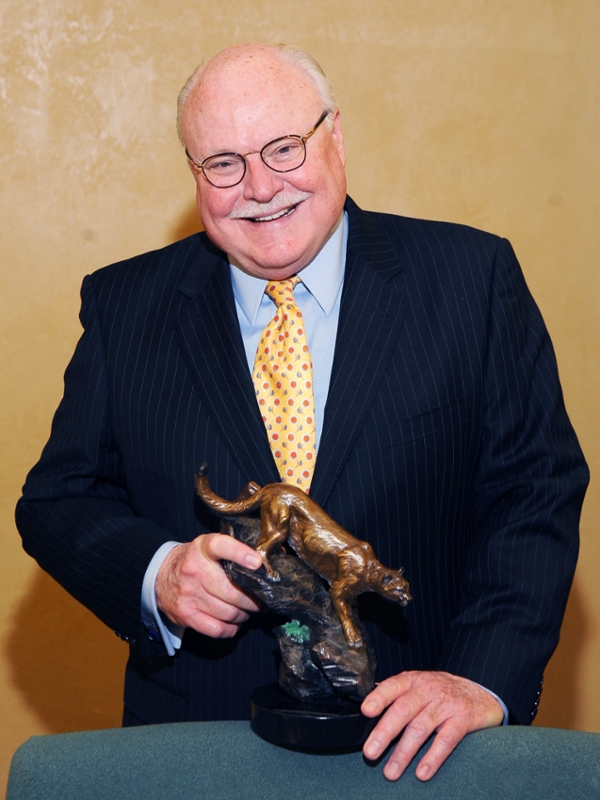 Department of Music
Department of Music
Margaret Alkek Williams Endowed Chair
College of Liberal Arts and Social Sciences
David Ashley White’s secular and sacred compositions are widely performed and published, and he has received numerous commissions from various organizations, schools, churches, and individuals. His vocal and instrumental music is recorded on several labels, including Zephyr—Echoes from the American Cathedral, a selection of White’s sacred music, sung by the St. Paul’s Choir, Houston, and The Blue Estuaries, which features his choral suite by the same name, commissioned and performed by the Houston Chamber Choir. On the Gothic label is Praise the Spirit, sung by the Palmer Church Choir, Houston, containing a number of White’s anthems, motets, service music, and hymns. And most recently, on the Albany label, is As you set out for Ithaka (2013), a selection of White’s secular music, comprising works for chorus, solo voice, solo piano, and chamber groups. White’s hymns are found in a number of books, including the Episcopal Church’s The Hymnal 1982 and its supplement, Wonder, Love, and Praise; The United Methodist Hymnal and its supplement; the hymnal of the United Church of Christ in Japan; Great Britain’s Worship Songs Ancient and Modern, and the forthcoming Glory to God: The Presbyterian Hymnal (2013). Also, three collections of his hymns are published by Selah Publishing Co., Pittsburgh, PA: Sing, My Soul: The Hymns of David Ashley White (1996), Songs for a New Creation (2002), and New Harmony: A Harp of Thousand Strings (2006). White holds a Bachelor of Music in oboe performance and a Master of Music in composition, both from the University of Houston, and he earned the Doctor of Musical Arts from The University of Texas at Austin. He has served on the faculty of the Moores School of Music since 1977. From 1999-2014, White was the school’s director and was the first recipient of the Margaret M. Alkek and Margaret Alkek Williams Endowed Chair.
2014 : Dmitri Litvinov
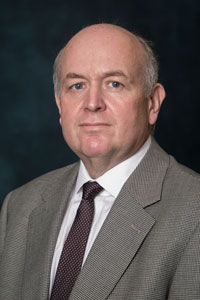 Department of Electrical and Computer Engineering
Department of Electrical and Computer Engineering
John and Rebecca Moores Professor of Electrical and Computer Engineering
Cullen College of Engineering
The University of Houston recently recognized the scientific and academic accomplishments of one of its most esteemed researchers — Dmitri Litvinov, vice provost and dean of UH’s Graduate School. Litvinov, the John and Rebecca Moores Professor of Electrical and Computer Engineering and director of the materials engineering program, is the recipient of the 2014 Esther Farfel Award, UH’s highest faculty honor. The Farfel Award symbolizes overall career excellence and carries a $10,000 cash prize. “I knew I was being nominated for the award, but I couldn’t believe that I was selected as this year’s recipient,” Litvinov said. “I know some of the previous honorees and the level of contributions they make to the University. I thought I didn’t have a chance.” Clearly, Litvinov’s colleagues and peers thought differently, and a number of them, so impressed by his work and commitment to UH, wrote letters supporting his nomination. “Dr. Litvinov’s record in research and service, as well as his commitment to teaching and student learning are truly outstanding,” said Badri Roysam, chair of the Department of Electrical and Computer Engineering and Hugh Roy and Lillie Cranz Cullen University Professor. Roysam, who nominated Litvinov for the award, added, “His contributions have been essential in elevating UH toward Tier I status and beyond.”
2013 : Michael P. Harold
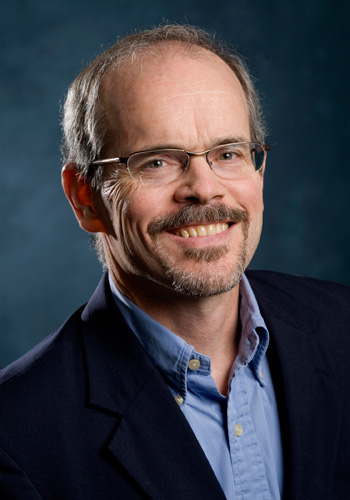 Department of Chemical and Biomolecular Engineering
Department of Chemical and Biomolecular Engineering
M.D. Anderson Professor of Chemical and Biomolecular Engineering
Cullen College of Engineering
Mike Harold, the M.D. Anderson Professor of Chemical and Biomolecular Engineering and chair of chemical and biomolecular engineering, has been awarded the University of Houston 2013 Esther Farfel Award. The honor, which comes with a $10,000 cash prize, is a symbol of overall career excellence and is the highest award UH bestows on a faculty member. The Farfel Award is given in recognition of excellent service as a researcher, teacher, mentor, scholar, clinician and administrator. “It is a great honor to receive the Farfel Award especially since it rewards accomplishments beyond research. While I’m proud of my research accomplishments, I’m more proud of helping my colleagues and students succeed,” Harold said. “I’m greatly indebted to my students, who do most of the work. Hopefully, I’ve helped get them prepared for the real world because that's what it's all about being a professor.” Harold was recently named chair of the Chemical and Biomolecular Engineering Department, a position he held previously at UH, and he is principal investigator of the Texas Center for Clean Engines, Emission and Fuels located in the UH Energy Research Park. His comprehensive outlook on education and mentorship, his research excellence and his ability to pay attention to details while keeping the overall picture in perspective were cited as a few of his attributes as an outstanding faculty member.
2012 : H. Julia Hannay
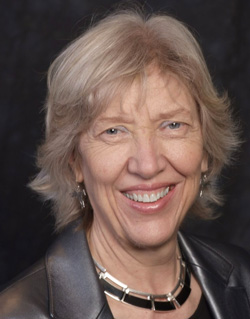 Department of Psychology
Department of Psychology
John and Rebecca Moores Professor of Psychology
College of Liberal Arts and Social Sciences
Julia Hannay, the John and Rebecca Moores Professor of Psychology, has earned the University of Houston (UH) 2012 Esther Farfel Award, a symbol of overall career excellence and the highest honor UH bestows on a faculty member. The annual award carries a cash prize of $10,000. “The Farfel Award is a high honor recognizing the many roles that we may have as professionals, as mentors, teachers, scholar/researchers, clinicians and administrators reaching out to the local, national and international communities to different degrees in our varied careers,” Hannay said. “The UH has afforded me the opportunity to strive for excellence in those roles in the multicultural environment that is so important to our future.” Hannay is the fifth woman to be recognized with the honor since it was first awarded in 1979. She is a clinical neuropsychologist and a pioneer in the field of experimental neuropsychology. “What I have always found so remarkable about Julia as a scholar is the breadth of her scholarship,” said David J. Francis, a Hugh Roy and Lillie Cranz Cullen Distinguished Professor, chair of the department of psychology and the 2008 Farfel Award honoree. “She has leveraged her great intellect, curiosity, and master of basic and applied experimental methods in psychology to advance our understanding of the brain and its role in human cognition from consciousness to complex human abilities, and how these develop and become disordered by injury and disease across the lifespan. Julia is a truly unique and remarkable colleague and we are very fortunate to have her in the department of psychology at the University of Houston.”
2011 : Ronald S. Harwerth
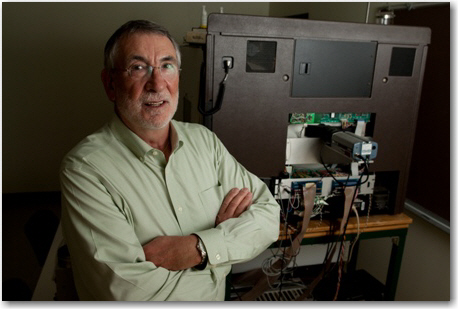 Department of Optometry
Department of Optometry
John and Rebecca Moores Professor of Optometry
College of Optometry
One of the world’s foremost glaucoma researchers, Ronald S. Harwerth, is the recipient of the 2011 Esther Farfel Award, the highest distinction bestowed upon faculty by the University of Houston (UH). Carrying with it a cash prize of $10,000, the Farfel Award is a symbol of overall career excellence. With the first award given in 1979, Harwerth is the 33rd recipient. “I feel very honored to receive the Esther Farfel award in recognition of my career at UH,” Harwerth said. “I am especially grateful to my colleagues and students for their support of my nomination.” Harwerth is internationally recognized as one of the most pre-eminent glaucoma researchers in optometry. In particular, he has tackled the difficulty of diagnosing glaucoma in its initial stages. In his landmark work, Harwerth pointed out the reason why the two basic tests for this disease do not always agree, with his findings explaining the different ways glaucoma presents itself. This significant work led to his standing among the world’s premier visual scientists.
2010 : Stuart Long
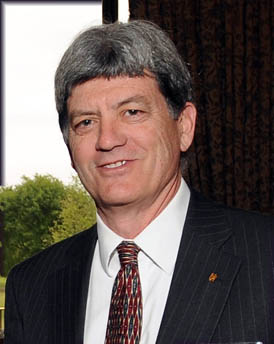 Department of Electrical and Computer Engineering
Department of Electrical and Computer Engineering
Associate Dean of Undergraduate Research and the Honors College
Cullen College of Engineering
Recognition for excellence has become the norm for Stuart Long, who was honored a year ago as the first winner of the Teaching Excellence Career Award. This year, the professor of electrical and computer engineering’s talent and dedication are being recognized with an honor of even greater significance. Long is the 2010 Esther Farfel Award recipient – the highest honor that can be accorded to a University of Houston faculty member. The award, a symbol of overall career excellence awarded annually since 1979, carries a cash prize of $10,000. Long is currently associate dean of undergraduate research at The Honors College. He also teaches a variety of undergraduate and graduate-level classes in applied electromagnetics, including electromagnetic waves, antenna engineering and microwave engineering. In a letter of support from a nominator outside of the University of Houston it was written that Stuart Long "is one of the leading authorities in Electromagnetic Research and Education because of his pioneering contributions in research and novel techniques in education. He certainly has made a lasting impact in our profession, and he has brought much recognition to the University of Houston and the students that he has mentored."
2009 : Demetre J. Economou
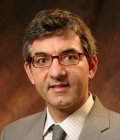 Department of Chemical and Biomolecular Engineering
Department of Chemical and Biomolecular Engineering
Associate Chair of the Department of Chemical and Biomolecular Engineering
Cullen College of Engineering
For his demonstrated excellence in all areas of faculty responsibility for more than
two decades, engineering professor Demetre Economou has been named the recipient of
the University of Houston’s highest faculty honor, the Esther Farfel Award, which
carries with it a $10,000 prize. “I am humbled and honored to receive this award,
especially knowing that some heavy hitters have received it in the past,” said Economou,
a John and Rebecca Moores Professor at the Cullen College of Engineering. “There are
quite a few top-notch faculty across campus who could have won it.” Economou joined
the university in 1986 and has been the associate chair of the department of chemical
and biomolecular engineering and the undergraduate program director of the department
since 1995. He also heads the Plasma Processing Laboratory.
“He is recognized nationally and internationally as the leading expert in plasma processing
of materials and the application of chemical engineering principles to the area of
manufacturing of electronic materials and now, more broadly, for the manufacturing
of nanomaterials,” said Ramanan Krishnamoorti, the chairman of Economou’s department.
“He also was the recipient of the Plasma Prize from the American Vacuum Society –
the highest honor in the field.”
2008 : David J. Francis
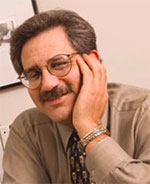 Department of Psychology
Department of Psychology
Hugh Roy and Lillie Cranz Cullen Distinguished Professor
College of Liberal Arts and Social Sciences
David Francis, Hugh Roy and Lillie Cranz Cullen Distinguished Professor, Chair of the Department of Psychology, and Director of the Texas Institute for Measurement, Evaluation, and Statistics (TIMES), received the Esther Farfel Award, the University’s highest honor recognizing faculty excellence. The award includes a trophy and a $10,000 cash prize provided through an endowment established by the late Aaron Farfel, former UH System Board of Regents Chair, in honor of his wife. Francis was key in founding the National Research and Development Center for English Language Learners within TIMES. Funded by a $10-million U.S. Department of Education grant, the project focuses on literacy and English language development of Spanish-speaking elementary and middle-school students. He also was among the researchers who founded the Texas Center for Learning Disabilities. The center’s development was assisted by an $8.5-million grant from the National Institute of Child Health and Human Development. It also combines efforts from TIMES and other institutions. Francis arrived at UH as a graduate student in 1979. He earned a master of arts and a doctorate in clinical neuropsychology, and in 1985, he was hired as a visiting professor. One year later, he became a permanent member of the UH Psychology faculty. Since then, he’s been proud to be a Cougar and is thrilled to call UH his home. “UH has been a great place for someone like me,” Francis said. “My work has been valued, and I have been treated well. To be encouraged to pursue the work that I find interesting, to be treated well and to have great colleagues, collaborators and students is all one can ask for in academia.”
2007 : Fazle Hussain
 Department of Mechanical Engineering
Department of Mechanical Engineering
Hugh Roy & Lillie Cranz Cullen Distinguished Professor of Mechanical Engineering
Cullen College of Engineering
Fazle Hussain will need a larger trophy room as this year’s recipient of the University of Houston’s highest faculty honor. Already one of the most decorated scholars in his field, Hussain now can add the 2007 Esther Farfel Award to his list of accomplishments. The award brings with it a $10,000 cash prize and an acknowledgement of overall career excellence. Coming to the United States from Bangladesh as a Fulbright Scholar in 1965 and joining UH in 1971, Hussain is the Hugh Roy & Lillie Cranz Cullen Distinguished Professor of Mechanical Engineering. As a fluid dynamicist, he has won all four of the field’s most coveted awards granted by the American Physical Society, American Society of Mechanical Engineers and American Institute of Aeronautics and Astronautics. He also has been elected to the National Academy of Engineering. He focuses primarily on the search for ‘order within disorder’ in fluid turbulence. His interests include aircraft drag and reduction for lower fuel consumption and pollution, as well as abetting wake hazard to reduce aircraft separation during takeoff and landing – a major problem at busy airports. Additional studies he is involved with include cardiovascular dynamics, cell mechanics, nanomechanics and energy. “As the only individual to be awarded all four major prizes in the field of fluid dynamics, Hussain is the world’s most celebrated scholar in the area of fluid mechanics and turbulence studies,” wrote a UH colleague in an endorsement letter. Leading the Aerodynamics and Turbulence Laboratory at UH, Hussain was one of the first to recognize that the organized motion underlying the seemingly random motion of turbulence is the key to understanding and controlling it for technological benefits. A colleague from another university wrote in a letter of support that Hussain is “one of the top five experimental turbulence researchers in the world. He serves as a benchmark against which people should measure themselves in our profession.”
2006 : Barbara Lee Keyfitz
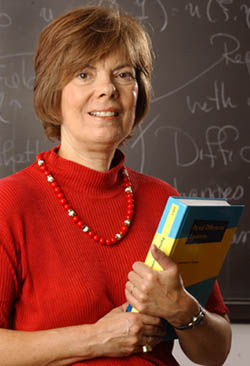 Department of Mathematics
Department of Mathematics
John and Rebecca Moores Professor of Mathematics
College of Natural Science and Mathematics
Barbara Keyfitz has her own equation for success. And it includes supportive parents, a determination to excel and international recognition for her contributions to applied mathematics. Thanks to that formula, Keyfitz, John and Rebecca Moores Professor of Mathematics, has earned the University of Houston 2006 Esther Farfel Award, the highest honor UH bestows on a faculty member. Keyfitz is the first female scientist to receive the award and the second person in her family to hold the honor. Her husband, Martin Golubitsky, Cullen Distinguished Professor of Mathematics and director of the Institute for Theoretical Engineering and Science, is the 1997 recipient. “I knew I was nominated, but I was quite surprised to have been selected,” Keyfitz said. “I didn’t see myself in that class, definitely not in my husband’s class, but I think he would quietly disagree with me.” Golubitsky not only disagrees, but also believes that Keyfitz is highly deserving of the honor. “I’m thrilled that Barbara was selected for the 2006 Esther Farfel Award,” Golubitsky said. “She has received national and international recognition for her research and has been extraordinary in her leadership in the mathematics community. It is so exciting to have Barbara’s efforts rewarded by the University of Houston, an institution whose mission we both love and respect.”
2005 : Martin Melosi
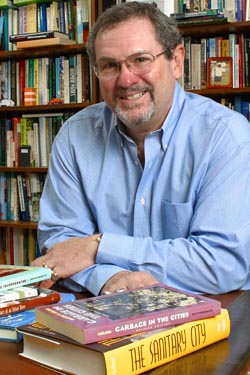 Department of History
Department of History
Hugh Roy and Lillie Cranz Cullen Professor of History
College of Liberal Arts and Social Sciences
When Martin Melosi steps into the classroom, he’s reminded why he’s remained at the University of Houston for 20 years. “The students at this university are very engaged,” said Melosi, a UH distinguished professor of history and recipient of this year’s Esther Farfel Award — the highest honor accorded to a University faculty member. “I find myself learning as much from them as they probably learn from me.” Aside from enjoying the stimulating classroom dialogue, Melosi admits that UH and the city of Houston make an ideal home for his academic interests, which include urban and environmental history and the history of technology. Considering the university’s urban setting and Houston’s complex social and industrial landscape, Melosi said he has a perfect laboratory for his research. “Being in an urban campus in a major city is crucial,” he said. “Houston is conducive to my work. I find that national urban and international urban trends are connected to the practical issues here in Houston.” Melosi has authored 10 books, including “Garbage in the Cities: Refuse, Reform and the Environment,” “Public History and the Environment” and the award-winning “The Sanitary City: Urban Infrastructure in America from Colonial Times to the Present.” His next book will center on the environmental history of Houston and will be co-authored by Joseph Pratt, Cullen Professor of Business and History. In addition to his regular classroom activity, writing and research, Melosi has served as the director of graduate studies in the Department of History and will be chair of UH’s Research Council during the 2005 – 2006 academic year. He is also the director of UH’s Tenneco Distinguished Lecture Series. “The Department of History values the many different activities he performs, the dedication he brings to this institution and ideas and advice he often imparts,” wrote Susan Kellogg, chair of the department of history and associate professor of history in her letter nominating Melosi for the Farfel Award. The award includes a trophy and $10,000 cash prize that is provided through an endowment established by the late Aaron Farfel, former UH System Board of Regents Chair, in honor of his wife Esther. Despite the high praise from colleagues, Melosi said that they are the ones who should be commended. Along with his students, his fellow faculty members also motivate him to strive for academic excellence. “Since arriving at UH, the Department of History has been a congenial place to work,” Melosi said. “Teaching and research are celebrated and encouraged. That’s important to me.”
2004 : Allan Jacobson
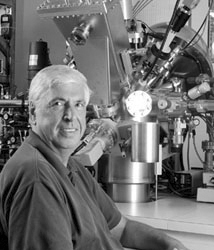 Professor of Chemistry
Professor of Chemistry
Robert A. Welch Chair in Science
College of Natural Sciences and Mathematics
Some aspire to win acclaim for their accomplishments. Others view praise as icing on the cake. Such is the case for Allan Jacobson, this year’s Esther Farfel Award recipient. “This is a very important award for a faculty member at the University of Houston, and it is a great honor to have been selected,” Jacobson, professor of chemistry, said. “Of course, one of the most important things about this university has been the opportunity to collaborate with people, not only in the chemistry department but in other departments, such as chemical engineering and physics. That has been very important in my research and has made a real difference in the work I do.” And, teamwork is crucial in accomplishing the goals Jacobson has set in researching fuel cells and their applications. From more cost-efficient power generation to reducing pollution emitted from big-rig trucks, the utilization of fuel cells has many aspects. And, Jacobson, who also is the Robert Welch Chair of Science and Chemistry, hopes that by developing new materials, and improving old ones he will generate research that leads to fuel cells that can be more widely used. “The intention is to make fuel cells more efficient and less expensive. Right now, they are used on a very small scale,” he said. According to Jacobson, fuel cells are currently being used to power space shuttles, and some companies use them to generate power at their plants. But, Jacobson’s expertise in chemistry isn’t found in his research alone. The director of UH’s Center for Material Chemistry also finds time to judge local science fairs and hosts visits to his lab for students in K - 12. “We are trying to reach out to young students and encourage them to get involved in the physical sciences,” Jacobson said. “We also want more undergraduate students doing research. The statistics aren’t good. We need to get students interested in the sciences.” To boost that interest, Jacobson said the center has a program, which is funded by the National Science Foundation, that brings in undergraduate students from UH and other universities to conduct research. “Even if they don’t choose that line of study, they at least have the appreciation and understanding for what science and research are about,” he said. The program is held every summer, with about 10 students participating. In the next five years, Jacobson hopes to shift the focus of his research. “I want to work on some things that I have become interested in over the past few years, including nano-science,” he said. “And, if that doesn’t work out, I’ll do something else.”
2003 : Arnold Eskin
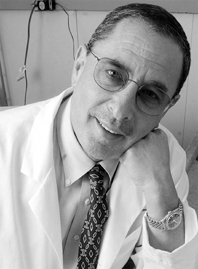 Department of Biology and Biochemistry
Department of Biology and Biochemistry
John and Rebecca Moores Professor of Biology and Biochemistry
College of Natural Sciences and Mathematics
It was his internationally renowned scholarship in neuroscience, along with his continuing contributions as a teacher and efforts in establishing and leading the Department of Biology and Biochemistry, that have earned Arnold Eskin the Esther Farfel Award, the University of Houston’s highest faculty honor. The author or co-author of more than 150 publications, Eskin has received numerous other honors, including being named the John and Rebecca Moores Professor of Biology and Biochemistry. He is the only faculty member to receive both the Farfel Award and the Moores Professorship in the same year. “It is unimaginable that I would win these awards because of the high standards set by the 24 previous winners of the Esther Farfel Award. Each of whom has truly outstanding credentials, said Eskin.” His principal research has been in the fields of circadian rhythms—the “biological clock”—and in learning and memory. “We’re interested in explaining the biochemical and molecular mechanisms through which the nervous system controls behavior,” he summarized. “We’re now investigating the impact of the biological clock on learning and memory in marine snails and in rats.” During his twenty-four-year career at UH, Eskin guided the merger of two departments into what is now the Department of Biology and Biochemistry. As department chair (1994-2000), Eskin tripled research grants to approximately $6 million per year and developed the department’s research foci of neuroscience, the biological clocks, and infectious disease. Eskin earned his bachelor’s degree in physics from Vanderbilt University and his doctorate in zoology from the University of Texas. “The really important aspect to this is the recognition it brings to the whole department, to our research teams, and to the many students who’ve made contributions. In some ways, this is like honoring a football coach—without the players; he’d never win anything. That’s certainly true in this case,” said Eskin.
2002 : Roland Glowinski
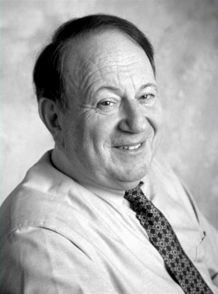 Department of Mathematics
Department of Mathematics
Hugh Roy and Lillie Cranz Cullen Distinguished Professor
College of Natural Sciences and Mathematics
As a child growing up amidst the chaos of World War II, Roland Glowinski demonstrated at an early age an interest and talent in mathematics and science. Eventually, this talent would establish him as one of the world’s leading researchers in applied mathematics and scientific computing. According to Glowinski, “Life is about change.” And since his arrival seventeen years ago at the University of Houston, the most gratifying change has been to see the university’s transformation into a quality urban research university. “That is why I came to Houston,” he says. “ When I was in France and the opportunity to teach in America came about, I pursued it.” Since his arrival, Glowinski was elected to the French National Academy of Technology, which is equivalent to the National Academy of Engineering in the U.S. In 1999, he was inducted as a chevalier in the Légion d’Honneur of France, the French equivalent to knighthood. Aside from his numerous honors, Glowinski, a specialist of computational methods for the solution of problems, considers his career to be one of his greatest rewards. Presently, his research focuses on the bioengineering and biomechanics problems relating to blood flow circulation and applying mathematical and computational methods in the design of a new class of heart valves and to cases related to the petroleum industry. Outside of such projects, UH students keep him busy. He hopes to impart some of the wisdom that has earned him international accolades to the many talented students that he teaches from semester to semester. “We have many outstanding students from all over the world,” Glowinski boasts. “Some of the students are truly gifted and may soon become valuable colleagues.” In addition to his position at UH, he maintains academic status at the Université Pierre et Marie Curie and serves as an advisor to numerous scientific institutions and agencies on both sides of the Atlantic. During the course of his career, he has authored or co-authored more than 200 scientific articles, six books, and served as editor for more than twenty scientific reviews and anthologies.
2001 : Michael A. Olivas
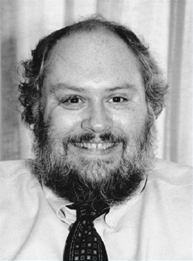 Institute for Higher Education Law and Governance
Institute for Higher Education Law and Governance
William B. Bates Professor of Law
Law Center
Michael A. Olivas, the William B. Bates Professor of Law and founder/director of the UH Law Center’s Institute for Higher Education Law and Governance, is humbled by his Farfel recognition. “I’m really honored to be in the company of such distinguished faculty. It’s a demanding job, but to be able to do this kind of work with students and the community -- I can’t imagine a better life.” Olivas is a leading expert on higher education law and has recently completed a second term as general counsel of the American Association of University Professors. A prolific scholar, he has been a member of the prestigious American Law Institute since 1986. He has served three times as chair of the Law and Education Section of the AALS and was on the editorial board of the Journal of College and University Law. His editorial activities include work for twenty-seven journals. During his nineteen years of service at UH, Olivas received this year’s Ethel M. Baker Faculty Award and is the recipient of the Distinguished Scholar Award of the American Educational Research Association and the Research Achievement Award of the Association for the Study of Higher Education. Olivas takes pride in the accomplishments of his former students. Three of them are on the UH faculty, and another six have been elected to the Texas Legislature. “I believe that nurturing young professionals, especially young professors, is the highest calling and the most rewarding vocation,” he says. “I am at the stage of my career where I am more delighted at my students’ achievements than I am at my own. It isn’t even a close call. When they get published, get elected to judicial or legislative office, start a law firm, start a family, win an important case, I feel very fulfilled.” A native of New Mexico, Olivas has secured more than $5 million in grants from various foundations. His most recent work involves efforts to help undocumented immigrants obtain access to Texas colleges and universities. “Professors get a unique opportunity to pursue truth and have the independence that you don’t have in most professions,” Olivas says. “I’m happy I’ve been able to strike a chord and do some positive things for people.” “Education is truly our society’s engine of upward mobility,” he says.
2000 : C. W. Paul Chu
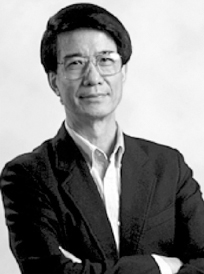 Department of Physics
Department of Physics
T.L.L. Temple Chair of Science
College of Natural Sciences and Mathematics
Named Best Researcher in the United States by US News and World Report in 1990, Professor C.W. “Paul” Chu has continued his award winning research as a professor of physics, director of the Texas Center for Superconductivity, and the T.L.L. Temple Chair of Science, since joining the faculty in 1979. In 1988, he received a National Medal of Science for leading a team of scientists in the discovery of high temperature superconductivity. Beginning in the summer of 2001, Chu will serve as president of the Hong Kong University of Science and Technology. He will continue to serve the University of Houston as the Temple Chair and lead his research program at the Texas Center for Superconductivity. “When I started my academic career thirty years ago, I was told that there were three missions of professors: teaching, research and service,” he said. “I think as a professor my ultimate duty is to teach our students and also to serve our local and global communities. I strongly believe that without research, a university's knowledge will become stale, and teaching and service will become less effective.” In 2000, Chu visited Washington, D.C., to contribute a sample of his groundbreaking research in the field of high temperature superconductivity to the National Millennium Time Capsule Project. Chu's work has resulted in the publication of more than 460 papers in referred journals, as well as entries on lasers and superconductivity for Funk and Wagnall encyclopedias. Born in Hunan, China, he received his B.S. degree from Cheng-Kung University in Taiwan. After service with the Nationalist Chinese Air Force, he earned a M.S. degree from Fordham University, Bronx, N.Y., and completed his Ph.D. at the University of California at San Diego -- all three degrees in physics. Chu is the recipient of more than a dozen honorary professorships and doctorates and awards, and belongs to a host of national and international societies and organizations. He believes the unique dynamics between UH and the city of Houston has enabled him to successfully do the things he loves most -- teach and study superconductivity. “Nowhere else in the world can you find such support,” he said.
1999 : Mark A. Rothstein
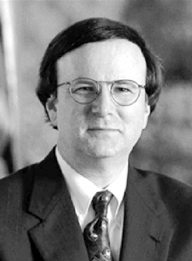 Health Law and Policy Institute
Health Law and Policy Institute
Hugh Roy and Lillie Cranz Cullen Distinguished Professor of Law
Law Center
When Mark Rothstein won the Farfel Award in 1999, he had been a faculty member since 1985, an award-winning law professor and a scholar at the helm of the university’s Health Law and Policy Institute, the top-ranked health law program in the United States. He was the first law faculty member to receive the Farfel Award. In January 2000, Rothstein was named director of the Institute for Bioethics Health Policy and Law, and the Herbert F. Boehl Chair of Law and Medicine at the University of Louisville School of Medicine. Rothstein is a renowned expert in health law, specifically the ethical and legal issues raised by the Human Genome Project. His distinguished career includes being named the 1999 National Public Hero of the Year by the University of California at Berkeley School of Public Health and the Hugh Roy and Lillie Cranz Cullen Distinguished Professor of Law at UH. The Health Law and Policy Institute, under his direction from 1986 to 2000, has been ranked as the top health law program in the country and continued that tradition by ranking first in the U.S. News and World Report Survey in April 1999. Cornell Law Library named the Health Law and Policy Institute's Web site, “Health Law Perspectives,” most valuable law-related Web site. The author of twelve books one of which is used as the standard reference in the field of occupational safety and health law for lawyers, Rothstein is the lead author of the employment law casebook presently used in more than 100 law schools and graduate schools. A Pennsylvania native, Rothstein received his bachelor’s degree with honors from University of Pittsburgh in 1970. He earned his juris doctorate in 1973 from Georgetown University, where he served as a law review editor. Rothstein believed that the Farfel Award recognizes professors who try to share their expertise with the community, something he has made a conscious effort to do throughout his career. “Public service should be an essential part of the life of a university professor,” he said. “Getting out in the community should be a goal of all educators. There are many reasons why: it improves the quality of your teaching and research; you serve as a role model; it improves university and community relations; and it helps pay our debt to society. Academics have a very privileged life, and this should be one way we give back to the community that gives so much.”
1998 : James L. Gibson
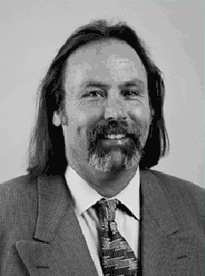 Department of Political Science
Department of Political Science
Cullen Distinguished Professor of Political Science
College of Sciences
James Gibson is a busy man. As with so many other Farfel recipients, his work has branched into disciplines beyond his primary academic department. Professor Gibson, who received his doctorate in political science from the University of Iowa, combines expertise in psychology, sociology, political science, and the law in his studies. “I was always going to be a lawyer when I was young,” he confesses. Instead, though, he became a university political scientist, largely for the intellectual freedom to pursue ideas that interest him. And the field of political science constantly presents him with new and surprising interests to pursue. “My fields of interest are always evolving. I’ve been surveying public opinions in Russia since 1990. In 1988 I’d never have dreamed I’d be working in the ‘Soviet Union.’” Nations and their political systems are his laboratories—he calls the reunification of Germany a controlled experiment—and the theories he tests tell him when and where he ought to work next. Professor Gibson joined the University of Houston faculty in 1983. He served six years as a Distinguished University Professor of Political Science until 1996, when he was named Cullen Distinguished Professor. As a teacher, Gibson stresses the process of learning as much as the content he teaches. “The most important thing is to respect students. You have to try to understand their circumstances in order to get them to be better students. They’re often looking for answers that are right or wrong. I don’t teach facts. I try to teach independent thinking, to allow them to do analysis for themselves. ”
1997 : Martin Golubitsky
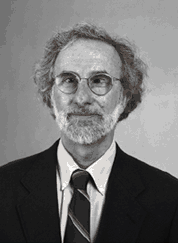 Department of Mathematics
Department of Mathematics
Cullen Distinguished Professor of Mathematics
College of Natural Sciences and Mathematics
Martin Golubitsky thought deeply before embarking on a career in mathematics. “I always knew I enjoyed doing mathematics,” he explains. “But I wasn’t quite sure that one could actually make a career of it.” In the years since he received his doctorate from MIT, Professor Golubitsky has demonstrated that it is indeed possible to do mathematics for a living. Professor Golubitsky has co-authored two non-technical trade books, Symmetry and Chaos (with Mike Field) and Fearful Symmetry (with Ian Stewart), in addition to dozens of scholarly papers and several textbooks. “Something that I’ve always striven for in my career and in the problems I work on is that they should be interesting,” Professor Golubitsky remarks, adding “whatever truth is, it doesn’t exist by itself in a vacuum. Mathematics is much more alive in this sense than I think many people realize.” Professor Golubitsky serves as chair of the Farfel Selection Committee this year. It is a difficult task, given that there are so many fine faculty members at the University of Houston. “The fact that it is a combination of research excellence, teaching, and service,” he comments, “is what makes the award so special. The Farfel Award is an important symbol of university approval and appreciation.” Professor Golubitsky smiles, adding, “Of course, the main thing is the sense of honor that goes with the award. It makes you feel terrific.”
1996 : James Symons
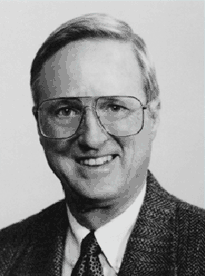 Department of Civil and Environmental Engineering
Department of Civil and Environmental Engineering
Cullen Distinguished Professor of Civil Engineering, Faculty Emeritus
Cullen College of Engineering
After receiving his degree in sanitary engineering from MIT, Professor James Symons participated in a pioneering study for the National Institutes of Health on the activated sludge process. This study laid the groundwork for the prevention of pollution in numerous waterways in the 1970s. Professor Symons taught at MIT for five years, then joined the federal government to lead many research efforts for providing safe drinking water for America. Professor Symons joined the University of Houston in 1982 after a distinguished 20-year career with the federal government, during which he was given the Environmental Protection Agency’s Distinguished Career Award. He has been recognized frequently for his service at the university. In 1995, Professor Symons was named Cullen Distinguished Professor of Civil Engineering and honored as the Abraham E. Dukler Outstanding Faculty Member. He earned an Outstanding Teacher Award from the Cullen College of Engineering in 1994 and 1996, and was given the Senior Faculty Research Award from the Cullen College of Engineering in 1994. Professor Symons retired from the University of Houston in 1997. The previous year he received the Farfel Award. “In my career at the University of Houston, I always tried to balance my research, teaching, and service,” explains Professor Symons. “Receiving the Farfel Award was most gratifying, as it validated my approach to university life.”
1995 : Nicolás Kanellos
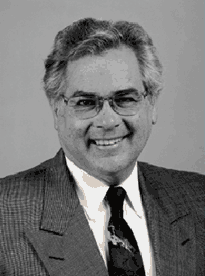 Department of Modern and Classical Languages
Department of Modern and Classical Languages
Brown Foundation Inc., Chair in Spanish, Director of Arte Publico Press
College of Humanities, Fine Arts, and Communication
In the 1970s, Nicolás Kanellos’s involvement with the Latino civil rights movement exposed him to many Hispanic artists and writers with little or no access to the publishing world. So in 1972, Professor Kanellos, whose Ph.D. is in Hispanic literature and theatre, founded The Americas Review (then called Revista Chicano-Riqueño) at Indiana University Northwest. In 1979 he launched Arte Público Press to provide a wider forum for Hispanic literary voices. Professor Kanellos brought his growing press to the University of Houston in 1980 to position it at the heart of the growing US Hispanic population. Today Arte Público showcases Hispanic literature, arts, and culture by publishing about 35 books a year. Professor Kanellos also manages the Recovering the US Hispanic Literary Heritage Project. In this project UH doctoral candidates locate and publish long ignored Hispanic historical documents “as part of an effort to broaden what is currently considered American heritage.” Professor Kanellos notes that the University of Houston is now “the leading institution in preparing a place for Hispanic culture in US cultural studies.” President Clinton has appointed Professor Kanellos to the National Council for the Humanities, while his work has been recognized by the Ford Foundation, the Coordinating Council of Literary Magazines, and the American Association of Higher Education, among others. Professor Kanellos shares the Farfels’ vision of promoting the ideal of the “well-rounded professor” in the university. Receiving the award has helped him “cut through some of the boundaries that exist between administering and research and teaching,” while providing a passport to advance his work within the university.
1994 : Simon Moss
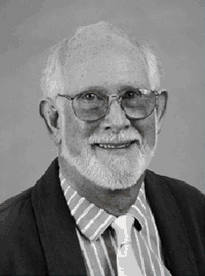 Department of Physics
Department of Physics
M. D. Anderson Distinguished Professor of Physics
College of Natural Sciences and Mathematics
Born in New York and educated at MIT, Simon Moss found his way to Houston only gradually, with several stops along the way. Professor Moss served as a professor in the department of metallurgy and materials science at MIT before traveling to Melbourne, Australia, as a Guggenheim Memorial Foundation Fellow. In the early 1970s he took a position in industry, but by 1972, he had joined the physics department at the University of Houston. Here Professor Moss has continued his research, in addition to teaching undergraduates and training over 50 graduate students and postdoctoral fellows. His efforts have been amply rewarded, both by the University of Houston, which granted him a Research Excellence Award in 1990, and by a number of international physics and science societies. In 1975, for example, he was elected Fellow of the American Physical Society. In 1979, he received the Alexander von Humboldt Foundation Senior Scientist Award, and in 1993, he received the David Adler Lectureship Award from the American Physical Society. Most recently, in 1994, he shared the Max Planck Research Award with Professor J.S. Peisl of Munich. Despite the multitude of awards and tributes Professor Moss has received, he maintains that the Esther Farfel Award, which he received in 1994, is among the most important. Receiving the Farfel, Professor Moss explains, “represents as nice a thing as a university can do. It’s really a way for the university to say ‘thank you—we’re pleased to have you here.’ Looking back on my career, I don’t think there’s much more that the university can do for me than it has already done.And that really is a very good feeling.”
1993 : J. Wayne Rabalais
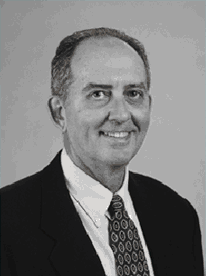 Department of Chemistry
Department of Chemistry
Cullen Distinguished Professor of Chemistry
College of Natural Sciences and Mathematics
Born in Bunkie, Louisiana, Wayne Rabalais received his doctorate from Louisiana State
University in 1970. He spent the next year in Sweden as a NATO postdoctoral fellow
studying photoelectron and Auger spectroscopy with the Nobel Prize winning professor
Kai Siegbahn. When he returned to the United States, Professor Rabalais moved north,
to the University of Pittsburgh. By 1975, however, he had come back to the South to
join the University of Houston’s rapidly growing chemistry department. Here Professor
Rabalais has continued his study of surface structures. As a result of his important
research, he has received numerous honors throughout his career. He is a member of
the Louisiana State Hall of Distinction, as well as the Phi Lambda Upsilon Honorary
Chemical Society. He has won two technical writing awards, of which he is deservedly
proud. In addition, in 1985, he won the University of Houston’s Research Excellence
Award. Professor Rabalais became a Cullen Distinguished Professor in 1988; in 1995,
he was awarded a joint appointment in both the chemistry and the physics departments.
Professor Rabalais received the Esther Farfel Award in 1993. He has also served on
the Farfel selection committee and therefore knows just how rigorous the selection
process is. “Receiving the Farfel Award is considered a tremendous honor,” he explains.
“It is undoubtedly the highest honor bestowed by the University of Houston. As a recipient,
I feel it’s a great compliment from the university, and an indication of their satisfaction
with my work.”
1992 : Sidney Berger
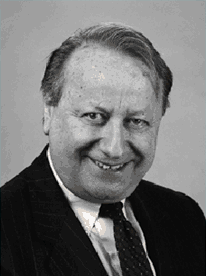 Director - School of Theatre
Director - School of Theatre
Professor of Theatre, John and Rebecca Moores Scholar
College of Humanities, Fine Arts, and Communication
This year Professor Sidney L. Berger celebrates his 30th year at the University of Houston. When he arrived here in 1969, having earned his doctorate from the University of Kansas, he set to work immediately to develop the fledgling theatre department. In the years to come, he would bring some of the most famous names in American theatre to the University of Houston. Indeed, the strides Dr. Berger has made in the last 30 years have benefited not only the University of Houston, but the cultural life of the greater Houston area as well. Dr. Berger lists among his successes the creation of the Houston Shakespeare Festival (1975) as well as the University of Houston Children’s Theatre Festival (1978), two programs that continue to enjoy great popularity throughout all of Houston. In addition, he has directed over 100 theatrical performances, as well as several films, and has written a number of scripts for both television and cinema. But despite these many successes, Dr. Berger counts the Esther Farfel Award among his highest career achievements:“Receiving the Farfel was an acknowledgment that the arts are of paramount importance to this university. That acknowledgment was a vote of faith in what we do here.” He continues, “You’ve got to keep in mind that in theatre, the work we do is really ephemeral: when I direct a production, it’s gone when the production is over save in the hearts and minds of its viewers. So when I was given this honor, I considered it an affirmation of the work I do. Having received it was truly an extraordinary and moving experience.”
1991 : John Lienhard
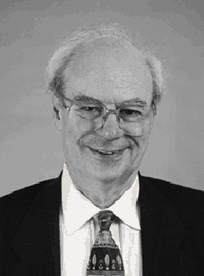 Department of Mechanical Engineering
Department of Mechanical Engineering
M. D. Anderson Professor of Technology and Culture, Mechanical Engineering, and History
Cullen College of Engineering
John Lienhard, host of KUHF’s “The Engines of Our Ingenuity,” has the most recognized voice at the University of Houston. Professor Lienhard, who received his doctorate from the University of California at Berkeley, is also the M.D. Anderson Professor of Technology and Culture at the Cullen College of Engineering. A highly sought-after speaker recognized in numerous radio markets, he has authored four books, hundreds of articles, over a thousand radio essays and has conducted research for many national agencies. Professor Lienhard doesn’t perceive the Farfel Award criteria—teaching, research, and service—as distinct activities. “We at the university have one function: to deal with knowledge. We must create, disseminate, and preserve knowledge. Creation of knowledge occurs every time you walk into a classroom. Preserving knowledge means putting it where it will be retained by the public. The dissemination of knowledge has to be associated with everything you do.” It is this clarity of insight and focus on the context of science and learning that endears his radio show to thousands of listeners daily. Professor Lienhard, who conducts his engineering research in thermal sciences, believes teaching happens when “you create a process within the student’s mind. One person cannot ‘teach’ another. Teaching in that sense is an illusion. What you can do is create a situation in which people learn, by creating questions, by creating an environment within which students become question-oriented. The good teacher is the person who does not get in the way of the student’s own creative process.”
1989-90 : Cynthia Macdonald
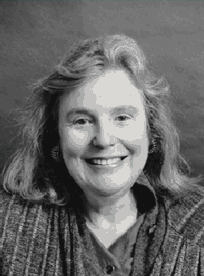 Department of English - Creative Writing
Department of English - Creative Writing
Professor of English
College of Humanities, Fine Arts, and Communication
Cynthia Macdonald never imagined she would work for the University of Houston. She was an established poet and tenured professor at Johns Hopkins when she consulted for UH in establishing its graduate Creative Writing Program in 1978. At first Macdonald turned down the offer to direct the program and move to Texas, so far from the known literary world. When she finally relented and joined the program in 1979, her writer-colleagues on the east coast offered her their sympathies, assuming she’d failed to get tenure at Johns Hopkins. It’s hard to imagine such a prejudice today against the program, now ranked second in the nation and home to numerous established and emerging authors. She considers herself a literary “Joanna Appleseed,” creating a community for her students and for the literary life of Houston. The community at the Creative Writing Program has had a tremendous impact both locally and nationally. Former students and faculty are widely published, teach classes in Houston and at institutions throughout the country, and participate in numerous reading series. Macdonald’s work draws from the world around her: “stone yielding/ the language everyone understands/ but cannot speak—poets carve what/ they are not allowed to say.” Still, she cautions that “all writing and all creative endeavors must come from the self, though they need not be about the self.” As a teacher of new writers, she encourages voices that diverge from her own. “I am not enthusiastic about students who write the way I do. They have to find their own voices and their own sensibility, their own way of ‘making’ a poem. They must remember that ‘poet’ means maker.”
1988-89 : Abraham E. Dukler (1925-1994)
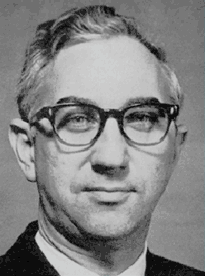 Department of Chemical Engineering
Department of Chemical Engineering
Distinguished Professor of Chemical Engineering
Cullen College of Engineering
When Abraham Dukler arrived in Houston in the early 1950’s, fresh from the University of Delaware with a doctorate in chemical engineering, he found a city on the brink of unprecedented economic and industrial activity. He worked for Shell Oil Company, teaching part-time at the University of Houston’s newly formed department of chemical engineering. Within a short time he joined the faculty as a permanent member, becoming one of the pioneering professors in the department. During the 1960’s, the department of chemical engineering experienced a period of rapid growth, facilitated in part by Abraham Dukler’s leadership during the time he served as department chair. Professor Dukler received a major grant from the National Science Foundation enabling the chemical engineering department to move ahead and take its place among the nation’s top engineering schools. Much of the grant went towards hiring faculty members and establishing outstanding laboratory facilities, so that by 1983, an Associated Research Council study rated the chemical engineering department the best in the South and among the top 10 nationally. Professor Dukler became the dean of the college in 1976, after having served as executive director of the Texas Governor’s Energy Council during the energy crisis (1973-75). In 1989, he received the Esther Farfel Award as well as the Cullen College of Engineering Alumni Distinguished Faculty Award. Although Professor Dukler died in 1994, his influence is still felt in the Cullen College of Engineering. “For many years Abe Dukler set the tone of the department,” says Professor James Richardson, Dukler’s colleague. “He was very influential, both as chair and as dean. We still miss him very much.”
1987-88 : John M. Ivancevich
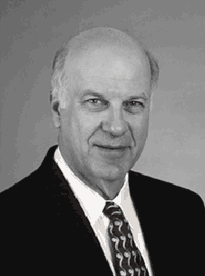 Department of Management
Department of Management
Cullen Distinguished Professor of Management
College of Business Administration
Jack Ivancevich recognizes that the computer on his desk, and on everybody’s, can be a blessing or “a monstrosity.” As the Hugh Roy and Lillie Cranz Cullen Professor of Organizational Behavior and Management, he conducts research on computer-based management, the impact of organizational stress on workers’ health and performance, the process of training through the internet and intranet, and computer phobias. Professor Ivancevich joined the University of Houston in 1974, serving as chair of the management department from 1975-76, and dean of the College of Business Administration from 1988-95. From 1995-1997 he was UH’s executive vice president for academic affairs and provost. He is especially pleased with the stewardship the University of Houston provided in helping to start up the MBA program at the Madrid Business School, essentially exporting the American MBA degree to Spain. Despite his administrative service, however, he considers himself primarily an academic. He thinks Aaron Farfel’s view of undergraduate education at the university has influenced him. “Whenever I met with Mr. Farfel, I was the one who benefited the most. If he wanted a bit of information, I came away from that meeting learning more about how to support an institution of higher education.” Today he insists on teaching undergraduate courses as much as possible. Professor Ivancevich considers teaching undergraduates absolutely essential for faculty members, because “only by teaching at this level can we understand the core of what our institution is and where it is going.”
1986-87 : Robert Hazelwood
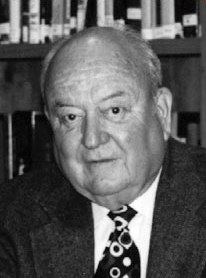 Department of Biology
Department of Biology
Professor of Biology, Faculty Emeritus
College of Natural Sciences and Mathematics
Robert Hazelwood was born in Oakland, California, and received his doctorate in comparative physiology from the University of California at Davis in 1958. He worked at both Boston University’s School of Medicine and the University of California at San Francisco’s School of Medicine before arriving at the University of Houston in 1963. Dr. Hazelwood’s research focused on certain aspects of diabetes. His research team at the University of Houston worked for a time in collaboration with the Kansas University Medical School, a joint effort that resulted in the discovery of a hitherto unknown hormone produced in the pancreas. Although Dr. Hazelwood is now retired, his influence is readily apparent in the work of his former graduate students, many of whom have attained top positions in industry and academic institutions. These graduate students, says Dr. Hazelwood, were one of the great pleasures of working at the University of Houston. While he misses teaching, he remains busy in retirement, traveling to Thailand during a part of each year—as he has done for the last 14 years—in order to teach at a medical school in Chiang Mai. Dr. Hazelwood received many honors during his career at the University of Houston, but the Esther Farfel Award was especially meaningful, he explains, because “it rewarded excellent work not in just one aspect of academic life, but in all areas: teaching, research, and community service. Receiving the Farfel meant that I was not overspecialized in one area or another, but rather that I was a complete academician. In that sense, it is a very special award.”
1985-86 : Juan Oró
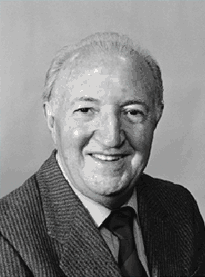 Department of Biochemical-Biophysical Sciences
Department of Biochemical-Biophysical Sciences
Professor of Biochemistry, Faculty Emeritus
College of Natural Sciences and Mathematics
On Christmas Day 1959, in the University of Houston’s Science Building, Professor Juan Oró exposed a solution of hydrogen cyanide and other chemicals commonly found in comets to heat and ultraviolet light. The reaction, which replicated conditions found on Earth some four billion years ago, produced not only amino acids, as theorized, but also adenine, one of the four chemical bases of the DNA code and a key component of ATP (adenosine triphosphate), an energy-carrier vital to cell respiration. Thus Professor Oró demonstrated the role comets played in the development of complex biochemical molecules, the first step leading to the evolution of life on Earth. Before he ever received funding from NASA or the National Science Foundation, Professor Oró pursued these studies on his own. To Juan Oró, this was about more than his job; he wanted to understand the position Homo sapiens holds in the universe. In the 1970s Professor Oró joined the NASA Viking program to search for organic matter on the surface of Mars. He disputed and ultimately disproved teammates’ claims they’d found evidence of microbe respiration in the probe’s chemical analysis of Martian soil samples, called “fines.” A firm believer in the scientific method, Professor Oró insists that all of his students learn to use and analyze results from the basic analytic tools of his profession. Professor Oró prizes both his 1986 Esther Farfel Award and the honorary doctorate in science UH gave him in 1998. He continues to conduct studies and instruct graduate students as Professor Emeritus, and credits his work to “a combination of motivation on my part and the freedom that I found at the University of Houston.”
1984-85 : Neal Amundson
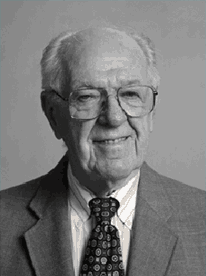 Department of Chemical Engineering
Department of Chemical Engineering
Cullen Distinguished Professor of Chemical Engineering and Mathematics
Cullen College of Engineering
A native of St. Paul, Minnesota, Neal R. Amundson received a master’s degree in chemical engineering and a doctorate in mathematics from the University of Minnesota. After taking his degree, Professor Amundson remained at the University of Minnesota, teaching both chemical engineering and mathematics. In 1949 he became head of the department of chemical engineering. It was a post he was to retain for the next 25 years, relinquishing it a short time before he joined the University of Houston’s chemical engineering department in 1977. Professor Amundson’s honors and awards are legion. He is a member of the National Academy of Sciences, the National Academy of Engineering, and the American Academy of Arts and Sciences. He was the first recipient and namesake of the Neal R. Amundson Award, given by the International Society of Chemical Reaction Engineering in 1996. Professor Amundson has published six books and almost 200 scholarly articles. He has also been awarded four honorary doctorates. The most dramatic symbol of his many successes, however, is undoubtedly Amundson Hall, the University of Minnesota’s chemical engineering building, which was named in his honor in 1982. What does Professor Amundson treasure most in his long and distinguished career? His answer bespeaks the dedication characteristic of those professors who receive the Esther Farfel Award: “The highlights of my career lie in having some very successful students,” he explains. He takes great delight in keeping in touch with as many of his former students as possible, adding, “They’re like your own children.”
1983-84 : Dan Luss
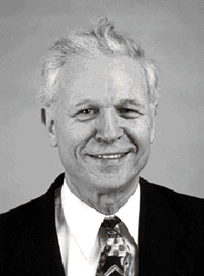 Department of Chemical Engineering
Department of Chemical Engineering
Cullen Distinguished Professor of Chemical Engineering
Cullen College of Engineering
Born in Tel Aviv, Israel, Dan Luss joined the University of Houston’s chemical engineering department in 1967. In 1975, he became chair of the department, a post he would hold for the next 20 years. Several professional awards, as well as his election to the National Academy of Engineering in 1984, recognize his research accomplishments. Currently he serves as interim chair of the department. Thus Professor Luss’s service to the department can be measured not only in courses taught and research undertaken, but in administrative duties as well. Chief among these duties was the expansion of the chemical engineering department, which was still in its infancy when Professor Luss first arrived at the University of Houston. As chairman, he set out to recruit strong teachers and researchers, and under his guidance, the department advanced significantly in rating, visibility, and prestige. In 1984, the year he won the Farfel Award, the University of Houston’s chemical engineering department was rated among the highest in the nation. Receiving the Farfel, explains Professor Luss, was an important indication of the university’s satisfaction with his work. According to Professor Luss, “the criteria for the award do not distinguish between teaching, research, or service; the Farfel Award recognizes a professor for being an educator, a scholar, and a university citizen.” It would be difficult to overestimate the influence of the Farfel Award on the university faculty. This type of award, Professor Luss explains, “motivates and promotes excellence among the faculty. It demonstrates that all their efforts—their hard work, their creativity, and their service—are highly valued by the university.”
1982-83 : Fredell Lack
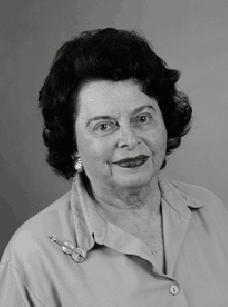 School of Music
School of Music
C. W. Moores Professor of Music, Artist-in-Residence
College of Humanities, Fine Arts, and Communication
Fredell Lack was a child of six when she began studying the violin. Later, after graduating from the Juilliard Graduate School of Music, Professor Lack embarked on a dazzling career as a concert soloist, winning many artistic awards. She has performed as soloist with the world’s finest orchestras, making more than 20 European concert tours, and touring Israel, Canada, Central America, and Mexico as well. Her recordings are available on five different record labels. But Professor Lack’s artistry does not end at the steps of the concert hall or the doors of the recording studio. She has also been instrumental in bringing the world of music to thousands of youngsters in the Houston area, both as a teacher at the University of Houston and as founder of Young Audiences of Houston. In 1979, she received the Fredell Lack Award, given annually to recognize outstanding contributions to the arts in education. When the Moores Opera House opened its doors in 1997, Professor Lack received a Lifetime Achievement Award, recognizing her 40 years of service to the University of Houston. Ironically, Professor Lack never intended to be a teacher. Drafted by Alfred Neumann, then University of Houston’s dean of arts and sciences, she joined the music faculty in 1959 and has never regretted it. The Farfel Award, which she won in 1983, is just one of many important honors Professor Lack has received. However, she explains, “of all the honors I’ve gotten, the Farfel Award meant the most to me, because it was awarded on the basis of my colleagues’ opinion. Receiving it was an especially wonderful experience.”
1981-82 : Don Kouri
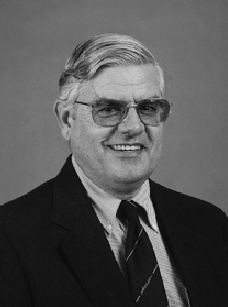 Department of Chemistry
Department of Chemistry
Distinguished University Professor of Chemistry, Professor of Physics
College of Natural Sciences and Mathematics
Donald Kouri joined the University of Houston in 1967 and was named Cullen Distinguished Professor of Chemistry in 1996. Throughout his career he has pioneered in the study of molecular collision theory, an interdisciplinary blend of physics, chemistry, and mathematics. To Professor Kouri, collision processes “are the underlying phenomena that constitute the heart of chemistry.” Typical of all Farfel recipients, Kouri has followed where his learning has led him. He’s taught and carried out research in Israel and Germany, and participated in international conferences throughout the world. Professor Kouri’s newest work is in digital signal processing, which can be applied to a variety of industrial and medical needs, including the fight against breast cancer. “Signal processing is at the cornerstone of what we’ll be doing in the future,” he explains. “This will be the dominant technique of the next century.” In his teaching, Professor Kouri focuses on leading students to see how mathematics relates to the real world. “I try to help students learn that mathematical equations are very compact statements that communicate how things behave.” In 1998, Professor Kouri received the Excellence in Research and Scholarship Award. He has also won the National Science Foundation’s Special Creativity Award and numerous other citations recognizing his work and dedication to science. He greatly values the “pat on the back” that receiving the Farfel gave him for his groundbreaking research. “You never really know what’s going to lead to important advances for mankind,” he believes. “Society needs people who have that kind of freedom and flexibility.”
1980-81 : Gertrud B. Pickar
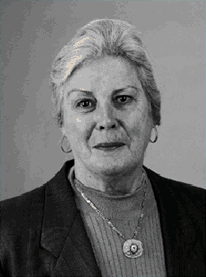 Department of Modern & Classical Languages
Department of Modern & Classical Languages
Professors of German, Faculty Emerita
College of Humanities, Fine Arts, and Communication
The study of German has captivated Gertrud Bauer Pickar throughout her professional life. Professor Pickar received her undergraduate degree from Allegheny College. After a year in Vienna as a Fulbright Scholar, she took a master’s degree in German from the University of California at Los Angeles. In 1964, she received her doctorate, also in German, from Rice University. Professor Pickar accepted a permanent position at the University of Houston in 1966, embarking on a career at the university that would span 30 years. Along the way, she garnered the Allegheny College Distinguished Alumni Gold Citation in 1983, as well as the UH Teaching Excellence Award in 1985. She served as department chair for 11 years, while still finding the time to publish seven books and over 50 scholarly articles. Professor Pickar retired from the University of Houston in 1996, and now lives in rural splendor in the Ozark Mountains of Arkansas. Professor Pickar’s service to the University of Houston was exemplary. She served on both the Faculty Senate and the University Council, in addition to several search committees and advisory boards throughout her years here. Of the Farfel Award, which she received in 1981, Professor Pickar says, “It’s the most significant award I’ve ever received. There are teaching awards, and there are research awards—and each category is valuable—but the Farfel Award is special precisely because it recognizes teaching and research combined with service to the university. We are all deeply indebted to Aaron and Esther Farfel for their generosity in devising a way to recognize the faculty’s dedication to the University of Houston.”
1979-80 : Richard Evans
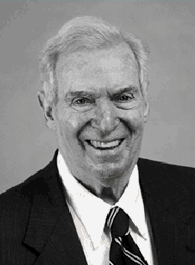 Department of Psychology
Department of Psychology
Distinguished Professor of Psychology
College of Social Sciences
The academic career of Richard Evans, Distinguished University Professor of Psychology, and director of the Social Psychology Program and of the Social Psychology/Behavioral Medicine Research Group, has been characterized by innovation. Professor Evans was the first professor in the nation to offer a college course through television. His pioneering research on the effectiveness of broadcast courses has helped to shape today’s growing field of televised instruction. With support from the National Science Foundation, Professor Evans also conducts his Notable Contributors to Psychology project, an oral-visual history program of recorded dialogues between Evans and this century’s leading psychologists. His interview subjects have included Jean Piaget, Erik Erikson, B. F. Skinner, Konrad Lorenz, Gordon Allport, Carl Rogers, Erich Fromm, and the first recorded interview ever granted by C. J. Jung. These videotapes enhance classroom instruction in over 300 universities today, and Professor Evans has based several books on these dialogues. His pioneering research in the prevention of cigarette smoking and substance abuse in children and adolescents has been funded through the years by the National Institutes of Health. His work originated the “social inoculation” model and its “resistance skills” training for at-risk youth, the basis today for successful school-based substance abuse prevention programs throughout the world. He’s also authored the U. S. Surgeon General’s Report on Smoking in Children and Adolescents. His most recent report commissioned by the National Research Council, National Academy of Sciences, Institute of Medicine, explores the problems of excessive gambling in youth. Of receiving the Farfel Award, Professor Evans considers it “most gratifying for a university professor to realize that his university appreciates his contributions in this demonstrable fashion.”
1978-79 : Ralph Becker
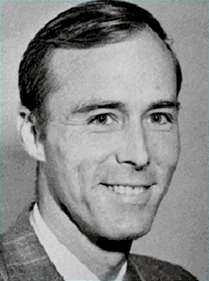 Department of Chemistry
Department of Chemistry
Professor of Chemistry, Faculty Emeritus
College of Natural Sciences and Mathematics
When Professor Ralph Becker retired in 1992 after 35 years with the University of Houston, he didn’t stop working. Besides operating a bed and breakfast inn in Eureka Springs, Arkansas, with his wife, he took positions with the University of Arkansas, the New University of Lisbon’s Institute of Chemistry and Biology, and the University of Perugia, Italy. He continues to teach special courses and conduct research in photophysics and photochemistry. At UH, Professor Becker studied the molecular level changes in the first steps of the visual process. His work today is challenging long held precepts in the study of light, providing scientists with a coherent story on how molecules dispose of their excited-state energy when excited by light and verifying a model he first proposed while at UH. His expanded model provides the basis for photochemical control, while his research in Portugal in photo bio-sensitizers will create new methods for killing bacteria, fungi, viruses, and cancer cells. Since the 1960s Professor Becker has been a visiting professor at universities throughout Europe, Asia, South America, and the United States. In 1980 and 1981 the American Chemistry Society recognized him for his contributions to photophysics and photochemistry. The first Farfel Award recipient, Professor Becker says the prize was a significant factor pushing him toward some of the “quantum jumps” in his research. Quantum leaps require one to “think more fundamentally than with the analytical mind,” he explains. “It requires curiosity, intuition, and the intense desire to really know what’s going on. It requires the confidence to believe that it is possible to achieve.”